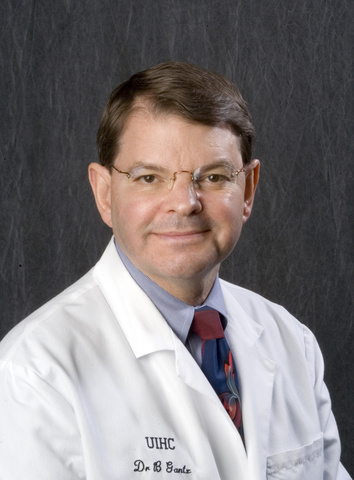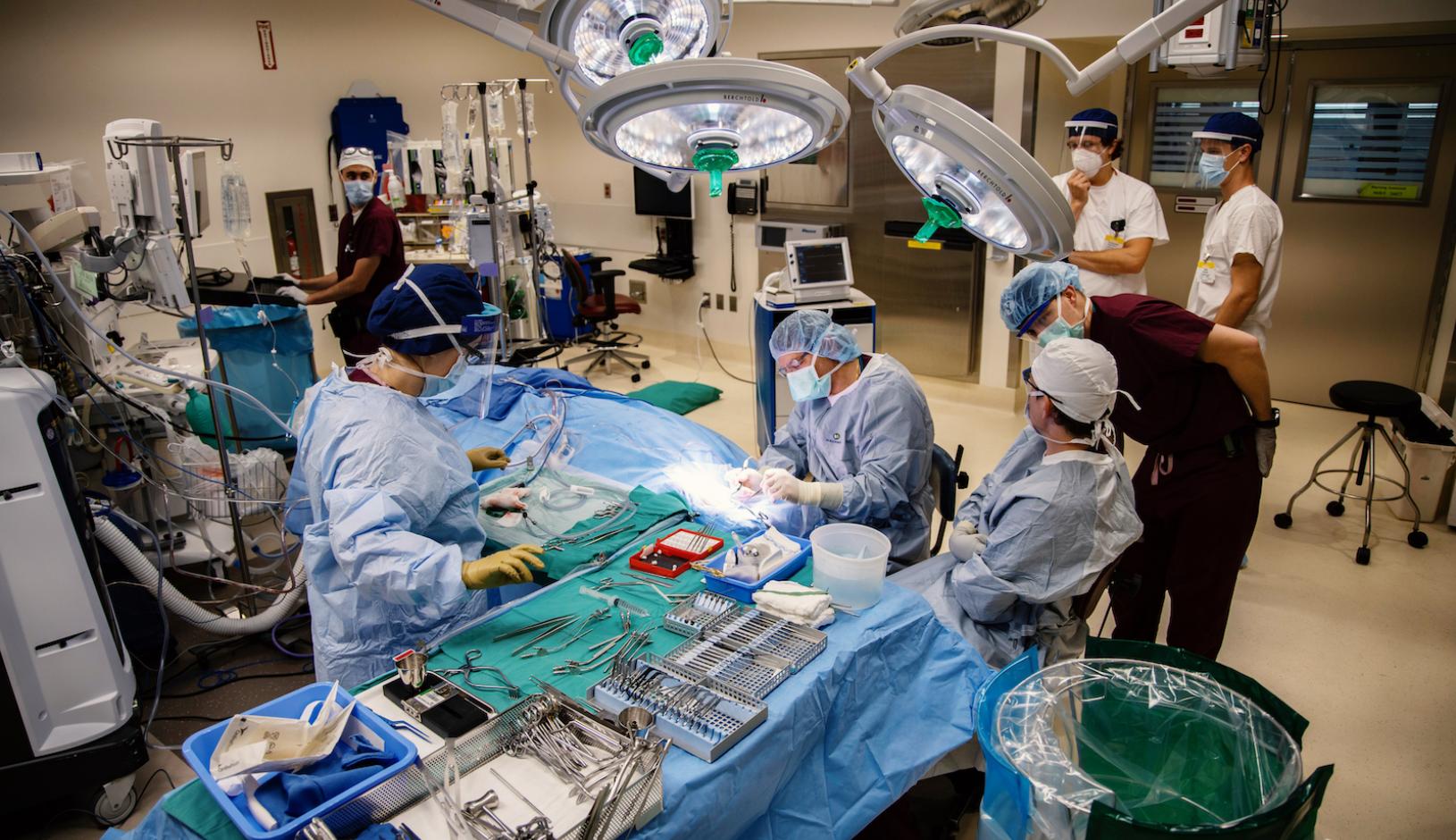
More than 40 years on and after thousands of procedures, Bruce Gantz, MD, vividly remembers how his first patient reacted when she received her cochlear implant in the early 1980s just as these devices were being introduced in the U.S.
“She was from Storm Lake, Iowa, and we implanted her with one of the single channel devices that gave an awareness of sound,” says Gantz, UI professor of otolaryngology. “When we turned it on, there were tears streaming down her face. Everybody was crying. She had not heard for 30 plus years, and this was the first time she was hearing anything. Although these early devices did not really discriminate speech, it improved her lip-reading ability, and she could communicate much better than she ever did. And that's how we got started with implants.”
In the more than four decades since that day, Gantz and his team have remained at the forefront of cochlear implant science, making major contributions to the technology that now allows thousands of children and adults with moderate to profound hearing loss to perceive and make sense of the auditory world.
Pioneering advancements in cochlear implants
As a young resident physician, Gantz traveled the world learning from the pioneers of cochlear implants in the US, Europe, and Australia. Armed with this knowledge and with a vision for how cochlear implants could benefit patients with hearing loss, Gantz returned to Iowa to develop standard best practices for the use and optimization of cochlear implants.
Gantz was the first surgeon to implant multi-channel devices in the U.S., including the first implanted into a child who was born deaf. Over the years, he and his team have continued to innovate and drive the evolution of cochlear implants, pioneering the use of bilateral implants to improve localization and developing a hybrid implant, which combines acoustic and electronic hearing to preserve normal hearing and improve hearing in noise.
More recently, Gantz performed the world's first robot-assisted electrode implant surgery. The robot system reduces damage to the inner ear by placing the implant electrode with a precision and delicacy unachievable even by an expert surgeon. The system was created by Gantz’s colleague Marlan Hansen, MD, UI professor and departmental executive officer of otolaryngology, and a former UI resident physician Chris Kaufmann, MD, and was approved by the FDA in 2021.

Backed by a center of excellence
The foundation for these advances and more has been the Iowa Cochlear Implant Clinical Research Center, which was established in 1985 with a grant from the National institutes of Health and has received continuous funding ever since. In 2023 the center received its eighth funding renewal from the NIH in the form of a five-year, $13.8 million grant from the National Institute on Deafness and Other Communication Disorders, bringing the total funding for the center to more than $76 million over 43 years.
Gantz has been the principal investigator since the center’s inception. Hansen is now co-principal investigator on the current P50 grant, which consists of four projects, an Administrative Core and a Patient Care and Statistical Core.
The multidisciplinary work draws on expertise from researchers and physicians in the UI Carver College of Medicine Departments of Otolaryngology, Neurosurgery, and Radiology; the UI Departments of Communicative Disorders and Speech, and Psychology in the College of Liberal Arts and Sciences, and the UI College of Public Health. The team also includes investigators from Ohio State University, and from the University of Newcastle in England.
New frontier: Hearing in Noise
Although cochlear implants (CI) are now regarded as the standard of care for individuals with profound hearing loss who want to perceive sound, and the modern devices provide significant improvement in word understanding in quiet environments, they still have limitations for hearing in noisy, real-world settings.
That’s the next frontier for Gantz and his team. The four projects funded by the new grant will study multiple aspects, from genetics and cell biology, to cognitive processing, to psychosocial factors, that influence the ability of CI users to hear in noise.
One team of researchers will test new strategies to minimize inner ear damage during cochlear implant surgery. The aim is to preserve low-frequency hearing, which allows CI users with hybrid implants to separate speech from noise. Two more research teams will investigate brain mechanisms that affect outcomes for CI users. These researchers will study various levels of cognitive processing that support hearing and speaking. The findings could help improve post-implantation outcomes. A fourth team will examine factors, like auditory environments, complex thinking skills, and social networks, that play a role in real-world listening success and quality of life for CI users.
Along with Gantz and Hansen, the principal investigators on these projects include Inyong Choi, PhD, UI associate professor of communication sciences and disorders; Bob McMurray, PhD, the F. Wendell Miller Professor in the UI Department of Psychological and Brain Sciences; Yu-Hsiang Wu, MD, PhD, F. Wendell Miller Professor, and UI associate professor of communication sciences and disorders; Camille Dunn, PhD, UI research assistant professor of otolaryngology; Karin Hoth, PhD, UI associate professor of psychiatry; and Tim Griffiths, MD, professor of cognitive neurology at Newcastle University Medical School, United Kingdom, and an adjunct faculty member in the UI Department of Neurosurgery.
An ideal environment for teamwork
Reflecting on the achievements and longevity of the Iowa Cochlear Implant Clinic Research Center, Gantz notes the critical importance of teamwork and collaboration, and the difference the work has made in the lives of the patients.
"There’s a saying that ‘silos belong on farms, not in a university,’” he quips. “The UI provides an ideal environment for teamwork. The ability to integrate is seamless here—we share probably better than most academic centers—I think that's a testament to what Iowa is all about.
“The opportunity to do this kind of work and help these patients we have here is unique and it’s kept me here all these years.”